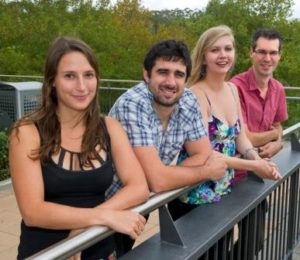
Four students from Flinders University’s Faculty of Science and Engineering will tonight (Monday, April 14) receive a prestigious Playford Memorial Trust scholarship to advance their research in areas of strategic importance for South Australia.
Students Jessica Buss, Carmen Da Silva, Paul Hughes and Jason Smith will accept their scholarships at an official awards ceremony, which will be opened by Flinders University Vice-Chancellor Professor Michael Barber at Flinders University Victoria Square this evening.
Established by the South Australian Government in honour of Sir Thomas Playford, the State’s longest-serving Premier, The Playford Trust awards up to four Honours Scholarships to each of SA’s three main universities to support student honours projects in the priority areas of agriculture, particularly horticulture and aquaculture; water, energy and climate change; advanced manufacturing and new technologies and; mining and resource development.
Each scholarship is valued at $5,000, with the Playford Trust providing $3,000 and the respective universities contributing the remaining $2,000.
As part of her scholarship-supported honours project, Ms Buss (School of Biological Sciences) will investigate ways to improve the survival and health of abalone in summer water temperatures using an antioxidant additive to aquacultural feed products. If successful, the technique would be a major breakthrough for abalone farmers and a significant economic benefit to the aquaculture industry.
Ms Da Silva (School of Biological Sciences) will explore the environmental effects of introduced Allodapine bees on the native bee population in Fiji, and whether they are capable of crop pollination. The outcome of the project could potentially indicate whether native Australian Allodapine bees can also be utilised for crop pollination, which may be beneficial to Australia amid the global decline of European honeybees, which are currently the primary pollinating species.
Mr Hughes (School of the Environment) will assess the current value of benefits from ecosystems, including food and water production, in the State’s Mid-North. The research will identify the trade-offs that occur as a result of ecosystem services, such as decreased biodiversity, in the ultimate goal of improving agricultural production.
Mr Smith (School of Biological Sciences) will investigate the relationship between gene expression and plant senescence, which is an important stage in a plant’s development involving the death of part of the plant to remobilise nutrient. The research aims to better understand the pathways involved in senescence to prolong the plant’s life, leading to improvements in crop yield.
Flinders University Deputy Vice-Chancellor (Research), Professor David Day, said the scholarship will allow the students to concentrate on their research at Flinders and to make meaningful contributions to issues of State importance.
“Our students are embarking on a diverse breadth of research that will not only enhance their collective knowledge and skills but make a direct impact on the future growth, development and sustainability of SA,” Professor Day said.
“On behalf of the University I commend the students for their thirst for knowledge, and wish them all the very best in the next step of their educational endeavours,” he said.

